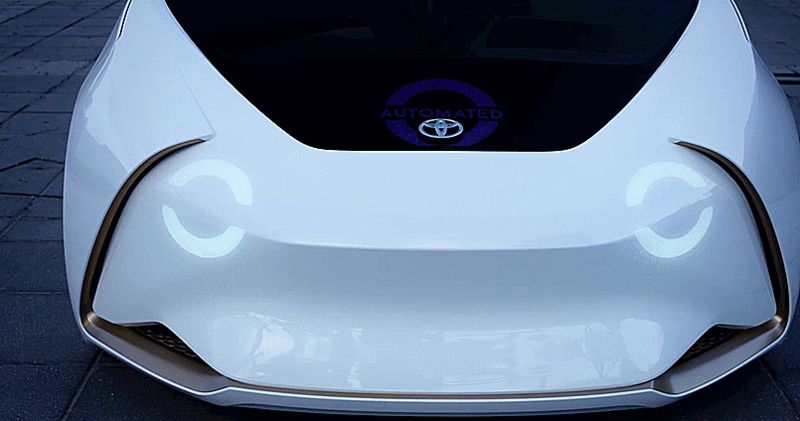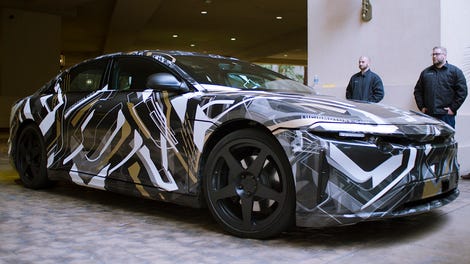
Automakers rebranding cars as “mobility products” that make driving more like surfing the internet was the story of last year’s Consumer Electronics Show. Doesn’t look like that’s changed in 2017, but the Toyota Concept-I takes the idea of a car as a “companion” a little further. It’s… conversational.
At first glance the Toyota Concept-I looks like every other futurevision Hollywood prop car with weird wheels, glass everywhere, wispy seats and basic features like turn signals exaggerated with needless, egregious complexity.
But the cool part, or creepy part depending on who you ask, lives inside the car. Deeper than the seats and steering wheel– it’s wired into the car’s central computer brain and it’s called “Yui.”
Advertisement
Advertisement
Yui is Toyota’s hypothetical artificial intelligence that helps you drive, keeps you company and acts like the human-cyborg relations protocol droid you never knew you needed to form a relationship with your car.
The Concept-I doesn’t use a bank of screens or gauges to communicate with the “driver.” The car’s occupants are simply sprinkled with lights and vibrations to communicate road hazards which may be relevant when the vehicle’s in “manual mode,” a function which mercifully still exists in Toyota’s future. Until the idiot meatbag behind the wheel makes a mistake, and then Toyota’s system “seamlessly” steps in to sort you out according to the press release.
The idea is that Yui will be adaptive to your driving style, and let you participate in the actual act of controlling the car as much as you want to. And as long as it thinks you’re up for it.
Sponsored
“…Yui would be coupled to the autonomy system, which would be constantly monitoring the car’s environment, inside and out merging human and vehicle situational awareness,” Toyota Executive Technical Advisor and CEO of Toyota Research Institute Gill Pratt said at the company’s CES press conference. “Perhaps YUI could engage the driver in a conversation, that would reduce the vigilance decrement the way talking on the two-way radio or looking for speed traps seems to do with truck drivers.”
Part of me finds the idea of blathering to your car really sad, but I also just rewatched the original Star Wars trilogy over Christmas and now I’m yelling at R2 to “lock it down” every time a piece of my Scout falls off.
Advertisement
If you want a sample of the insufferably of trade show press conferences and how Yui would hypothetically communicate, here’s the transcript of Toyota’s Senior Vice President of Automotive Operations Bob Carter bantering with what I assume was a prerecorded piece of dialog coming from the car:
[BOB:] Say “hello”, Yui.
YUI: HELLO YUI.
[BOB:] Very funny. Yui learns from us, grows with us, and builds a relationship that is meaningful and emotional. What does that mean? Yui learns our preferences and our lifestyle; remembers where we like to go; pays attention to when we’re happy or sad.
[YUI SCANS BOB, PULLS UP INFO AND BIOMETRICS]
And helps in ways that are big and small, anticipates our needs and improve our lives.
YUI: IS EVERYTHING ALL RIGHT, BOB? YOU SEEM STRESSED.
[BOB:] What did you expect, Yui? I’m on stage giving a speech to all these people.
YUI: COME ON, BOB. WHY DON’T WE DO SOME BREATHING EXERCISES?
[BOB TAKES A FEW DEEP BREATHS]
[BOB:] Thanks, Yui. Much better.
[BOB:] But what are you still doing up there on the screen? You’re supposed to be down there so I can let everyone see this amazing car!
Theoretically all this flashy silliness will be distilled into tech that’s practical in the short term, and Toyota promises they’re working on that too. “Yui” is just an idea of what the ultimate incarnation of the company’s “Chauffeur” self-driving tech could look like, and Chauffeur is supposedly being built off the “Guardian” suite of driver-aids you already know and love or hate like lane keeping and collision-avoidance alerts.
Advertisement
I’m not sure we’ll be having articulate, two-sided conversations with our cars any time soon and I sure hope they never turn into giant turn signals but it seems clear that the trend toward “self-driving” is only going to get hotter.
















